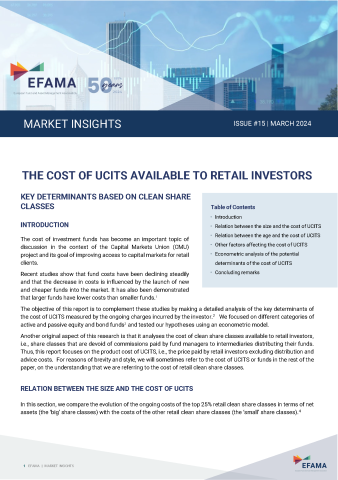EFAMA’s latest research shows the average product cost of active and passive equity UCITS available to retail investors fell to 1.04% and 0.27% respectively in 2022.
The European Fund and Asset Management Association (EFAMA) has released today a new issue of its Market Insights (MI) series titled “The cost of UCITS available to retail investors - key determinants based on clean share classes”.
This report delves deep into the core factors that impact the cost incurred by retail investors in equity and bond funds. It focuses on the cost of clean share classes, i.e., the price paid by retail investors excluding distribution and advice costs.
- The simple average cost of clean share classes of equity and bond UCITS aimed at retail investors continued to decline in recent years. This trend can be ascribed to the surge in passive investing, increasing cost transparency, and advancements in technology driving down operational costs.
- Fund size is a pivotal factor influencing costs. Larger share classes exhibit relatively lower average costs compared to smaller ones across all sub-categories. This is attributed to economies of scale enabling funds to spread fixed costs over a larger asset base.
- While the simple average cost of UCITS share classes proves to be lower than that of US mutual funds, the average asset-weighted cost of US mutual funds is significantly lower. This discrepancy can be attributed to the size and high degree of integration of the US mutual fund market that allow fund managers to leverage a sizable client base and achieve substantial economies of scale.
- Newer share classes tend to incur lower costs. As they lack an established performance track record, newer funds often charge a lower fee to attract investors.
- Beyond size, factors such as investment strategyand geographical focus also impact fund costs. Funds investing in specific asset classes or geographic regions may entail higher research costs.
Vera Jotanovic, Senior Economist at EFAMA, commented: “Our detailed analysis focusing on clean retail share classes shows that fund size is an important determinant of fund costs, and that newer funds tend to have lower costs. However, a variety of other factors have an impact and should be taken into consideration when evaluating fund costs.”
Bernard Delbecque, Senior Director at EFAMA commented: “The report highlights that cost differences among various fund categories are small, particularly when compared to disparities in net returns. This observation carries two important implications: firstly, it confirms that cost alone should not dictate fund selection; and secondly, it emphasizes the potential benefits for retail investors in seeking financial advice to facilitate well-informed investment decision-making.”
- ENDS -
Notes to Editors
For further information, please contact:
Hayley McEwen
Head of communications and member development
About the Market Insights
EFAMA’s Market Insights series analyses recent industry trends and developments based on the latest available data and presents our findings in the context of current policy perspectives. We publish numerous concise reports each year covering diverse topics such as ETFs, SFDR, the impact of inflation on retail investors, sustainable bond funds, UCITS costs and performance, ESG fund markets, and money market funds.
More info on Market Insights can be found on our website here.


























